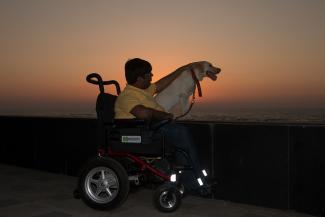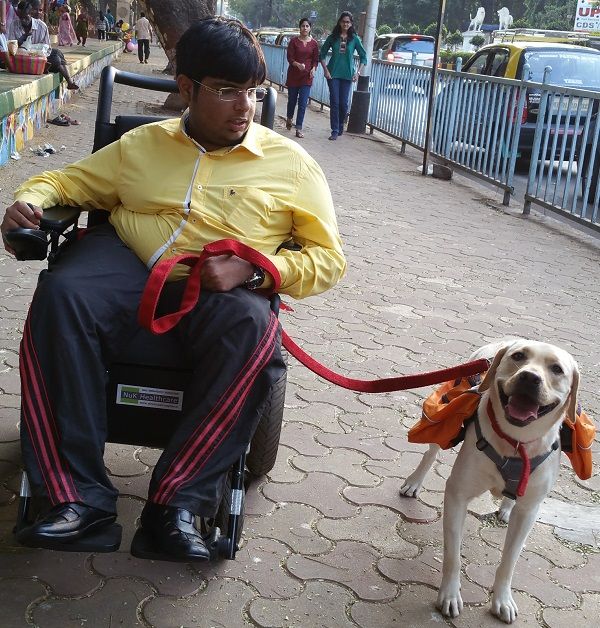
Karan Shahh, 20 shares his journey with SMA III, the support of his family and a well trained dog, Angel. Socially and digitally savvy, he refuses to be pitied and told how to live his life. His mother Pratima shares advice for other parents and in similar position and how her advice to her sons always was - "you can never walk, but let’s build on what you can do.”
1. Please tell us a bit about your condition
I have type III Spinal Muscular Atrophy or SMA. SMA is a genetic disease that affects the motor nerves that control voluntary muscle movement. Type III is also known as Kugelberg-Welander disease.
2. Please describe your experience of managing your condition.
It was tough growing up especially in a city like Mumbai which is not wheel-chair friendly at all. My parents had to search for schools and colleges that would accommodate me. Many schools rejected me assuming that I was also mentally incapacitated. People don’t realize that SMA does not affect the intelligence quotient of any person. I finally went to Aditya Birla Integrated School which was known as JBCN, but it was not very wheel-chair friendly either. However, the school provided me with special aid and helped me adjust and overcome my dyslexia. Making friends initially was not easy. I was judged about my condition, but my communication skills became my ice-breaker. I soon became notorious for being the mischievous kid on the motorized chair. I was known for pulling pranks and being the smart-ass. I was the speaker every annual day function.
My older brother too had SMA, his being type II. He passed away due to a cardiac arrest at the age of 14 years. He was just a year older than me. It was a trying time for me and my parents. A few years later, I had enrolled for Shamak Davar’s dance classes, which he conducts for special needs children and kids with cancer, etc. Once he came home to meet me and told me I needed an angel in my life. It made no sense then but soon after, he gifted me a female labrador pup called “Angel”. Being a dog-lover, I was thrilled. I went on to then Google search for a trainer who could train my puppy. I came across Shirin Merchant who advised me that it should be me and not anyone else who should train my pup. So I undertook her training course and learned to become a Dog Behaviourist myself. Angel is a very mischievous (like me) and active dog with lots of energy but also receptive to learning. She is now 4 years old and I have trained her to perform several tasks. These include: (Don't miss the video below)
- Removing my socks when I reach home.
- Putting away my shoes in the shoe drawer.
- Handing me keys to lock my cupboard.
- Pulling the blanket over me when I’m lying down.
- Calling my mother on command: she goes and barks at her three times.
- Fetching the morning newspaper which she usually hands over to my dad.
- Bringing my phone.
- Following the swacch bharat udyan: will pick up trash and put it in the bin.
I continue to teach her new things even today. I came across Therapy Training for dogs who assist in providing support and comfort at hospital, seniors citizen homes etc. I will be commencing that training for her soon.

3. What keeps you busy?
I divide my week between two jobs; one being working at the family business of a retail clothing store and the other as a Professional Dog trainer & Behaviourist. I also volunteer with WSD or Welfare of Stray Dogs, a local NGO in Mumbai.
4. How has your family supported you? Who has been your biggest support/companion through it all?
For me, Angel is my biggest support, she had truly brought out the best in me over these past 4 years. She has helped me through my lows and been the best thing that happened to me. In addition, she is protective of me and I recall, she once pounced on my physiotherapist because I was wincing while performing some exercise. My parents of course stand by me through it all.
5. How is your social life?
I have a few select but close friends that I hang out with. Going out to restaurants is a task, because I have to call and check on their ramp access. Many a times, I have to send someone to check out the premises in person. I love watching Bollywood movies but again most theatres are not accessible for me. Like any young guy, I religiously follow social media sites. I occasionally write articles on my Facebook page and have over 20,000 followers on my Tik Tok app profile. Funnily, I have also received marriage proposals from viewers who watch my videos on this app. I have an active love life with a history of girlfriends over time.
6. What were some of the challenges you faced and what is your advice to patients who face similar challenges?
Not finding wheel-chair access easily has been the biggest challenge for me. I hope that changes in a big metro like Mumbai. I believe that it’s the normal people who require advice and education and not people like me. I want to tell the 'normal' person, that we do not need any pity, sympathy or guidance on how to live our lives. I am neither special nor disabled, I’m just me! To further emphasize on this point, I have started a hashtag called #differentlynormal which can be found on Facebook and other social media sites.
"We decided not to keep them in a bubble. We took them to every social occasion and all family events." - Pratima Shah ( Karan’s mom) shares her experience:
1. When were your sons diagnosed with SMA?
My eldest son Mihir was 11 months old when he was diagnosed and younger one Karan was diagnosed when he was 15 months old.
2. What were the early symptoms? What made you go see a doctor?
When my oldest son Mihir was diagnosed, I was educated about the genetic link and advised to not have any more children. However, I was already 6 months into my pregnancy with my second child by that time. Mihir, who had type II SMA was given a life expectancy of 6-7 years but he lived on till age 14.
We kept a close watch on baby Karan because we knew what to look out for. He didn’t show any early signs till after age 1. We noticed, he had a waddling gait, needed support to get up, couldn’t run or take any weight on his muscles. I took him for a blood test when he was 15 months old to confirm my fears. He was found to have type III SMA. He continued to walk, more like waddle till age 4, but soon after had to start using a wheelchair.
3. Has he had any related complications from his primary condition?
He has developed mild scoliosis, which is curvature of the spine due to his condition. It is a common complication seen in SMA patients. This is despite him wearing braces to keep his spine straight. Scoliosis can affect one’s heart and lung, leading to breathing difficulties and even cardiac/respiratory failure. We did consider a surgery to correct his scoliosis when he was young but Mihir convinced Karan to avoid such a long grueling operation with a 6 month recovery period and minimum benefits.
4. Is he on any treatment or medications?
No.
5. What kind of specialists do you consult?
Physiotherapy is very pertinent for him to maintain muscle tone, relax any contractures and stiffness. We also take him swimming regularly (aqua therapy) to facilitate movement of all his body’s muscles.
6. What changes have you made to your lifestyle?
When the children were babies, I had to devote all my time to them. In the process, I had to cut down on my social life and unnecessary expenses. With two kids in the wheel chair who needed constant attention and aid, it was a challenge to manage by myself. Back then, there are no motorized chairs and the kids had no strength to pull the mechanical ones on their own. They could not even lift the spoon to eat their meals. Eventually, I had to hire help to pick them up and help them with the daily routine. We even installed a lift in our building and moved to a lower floor.
It was tough in the beginning; I used to cry a lot. I soon realized that I had to focus on the positives. I told myself that,” at least my children are mentally capable and able to communicate with us about everything. They are intelligent and stable, which is a blessing”. We decided not to keep them in a bubble. We took them to every social occasion and all family events. With family events, we were clear that if the venue was not wheelchair friendly, we would not attend. We provided them with the social exposure and support to overcome any fears or weaknesses. I would tell them clearly that “you can never walk, but let’s build on what you can do.”
Since the past 3-4 years, since Karan is more independent, I have the time to socialize again. Karan is urging me to take up baking which has been a passion of mine.
7. Have you tried complementary medicine or therapies, like homeopathy or yoga? If yes, did it help?
We have tried everything from Homeopathy, Ayurveda to Acupressure etc. but the truth is we never believed in any of it. My only aim was to reduce his frequent bouts of colds and coughs.
8. Are you in touch with other parents of children with SMA? What is your advice to them?
3 years back, Alpana Sharma took the initiative to search for other parents and created a Whatsapp group. We are now a national group with over 200 members. My advice to other parents would be:
- Accept your children the way they are. Acceptance helps you move forward and start thinking of practical solutions.
- Stop comparing them. Many parents unknowingly do this all the time, even amongst siblings. Children may get the feeling that one is favored over the other.
- Show them the real world. Don’t shield them from the realities of life.
9. What keeps you awake at night?
I am very happy with the way Karan has grown up and become this independent and confident young man. However, I do worry about what will happen to him after me and my husband is no more. The world is a cruel place, so I warn Karan to be wary of people who may want to take advantage of him. People know that he is now the only child and heir to our possessions, and are likely to exploit that. We have thus decided to make a concrete will that states no property/cash will go to him directly but will be under the guardianship of certain nominees from our family. This will ensure Karan’s safety while guardians will provide for all of his needs. Upon Karan’s demise, the aim is to donate to a well-meaning NGO.






